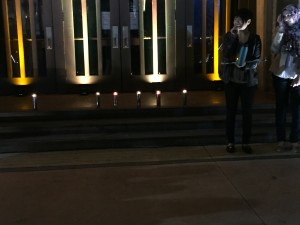I was asked to speak tonight at an interfaith gathering which was a memorial for the fourteen people who were killed in the San Bernardino attack, and a chance to come together as a broad and diverse community to reject Islamophobia.  This is what I said:
This is what I said:
One aspect of the traditional Jewish way of mourning is to recite the so-called Jewish prayer for the dead, the Kaddish. The Kaddish, however, is not actually a prayer for the dead. It is a prayer that glorifies God.
yitgadal ve-yitkadash shmay rabbah. May the name of God be glorified and sanctified. Our tradition tells us that when we say the kaddish, God mourns saying: “They are praising Me, and yet look at my ravaged world.” (Bavli Berachot 3a) God’s tears mingle with our tears. We mourn together. Tonight we mourn the fourteen beautiful souls who were killed in San Bernardino in a horrific act of terrorism. An act that blasphemed the name of God, as all acts of murder do. Unfortunately, we are coming together more and more often to mourn the consequences of terrorist mass killings in the United States. In Charleston, in Colorado, and now in San Bernardino.
be-alma di vra chir-utay ve-yamlich malchutay, in the world that was created according to God’s will, in order for it to reflect God’s kingdom. When we claim that there is one God, we claim that that God is the God of everyone. When we claim that God is the God of everyone, we open the circle of people who together can build a world in the image of that God. God whose name is also shalom, peace. When we exclude people or whole communities from that circle—we are literally cutting into the image of God. And God’s tears mingle with our tears.
ba’agala u-vizman kariv, soon and in our days. This is our charge. In the fierce urgency of now we are commanded to reach out to each other, to stand strongly together, and to say: “We do not build the world in the image of God by denigrating other people. The beautiful mosaic of God’s people cannot be contained within the parameters of one liturgical tradition, of one set of religious symbols. God who is beyond all cannot be grasped by one Scripture, one dogma, one law. God is refracted in all the facets of belief which are expressed by all the religious traditions—eastern and western.”
We come here tonight to say that we will meet hatred with love. We will forego the false security of scapegoating some Americans, Muslim-Americans, in favor of the actual strength of unity and love. We remember what happened when after Pearl Harbor we let our fear get the better of us, and we forgot that Japanese-Americans were our brothers and sisters, and we sent them to concentration camps—camps from which some then left to fight in the American Army. We remember that while American troops were fighting Hitler’s Nazi ideology of anitsemitic genocide in Europe, Father Coughlin was preaching antisemitism in America—and African-American soldiers would come back from the war to the Jim Crow South and racism in the north.
We will not let this new wave of intolerance, bigotry, racism, and Islamophobia stand. This is our highest obligation as fellow humans walking this planet. Your well-being is my obligation.
yitbarach ve-yishtabach ve-yitpa’ar ve-yitromam ve-yitnasay ve-yitaleh ve-yitahalal shmay de-kudsha brikh hu, le-ayla min kol birkhata ve-shirata tushbekhata ve-nehemata da-amiran be-alma, may the Name of God be glorified far higher than anything we might say here in this world. There is a time when prayer comes to an end. When the world is so broken that we must stop looking up, and start looking at each other, seeing each other, working with each other. That time is now. We must actively seek peace—we must know each other, visiting each other’s Temples, Mosques, Churches, Synagogues, Gurdwaras—visiting with each. We must talk to each other. We must rid our communities of hatred, and stand together against any who want to enact their hatred with violence.
We go forth from here today to create a more perfect union, a more just and peaceful world, and thus we are building the kingdom of God.
